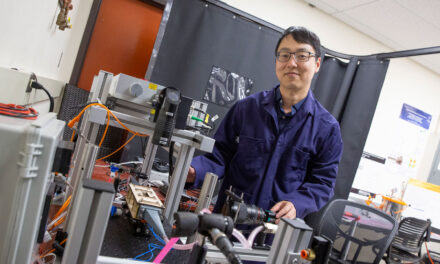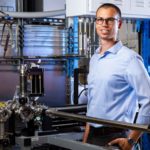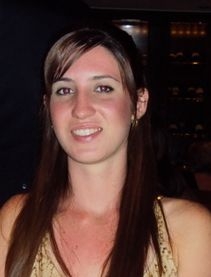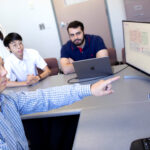
Engineering students receive opportunity to do top-flight research
Posted: July 06, 2010
Electrical engineering majors Christina Clancey-Rivera and Jeremy Wendte are among 21 ASU students who recently earned an opportunity to study abroad with support from a prestigious Fulbright grant.
The Fulbright grants are part of an international educational exchange program sponsored by the U.S. government and designed to promote understanding between U.S. citizens and people from other countries.
Students are chosen to participate based on academic merit and leadership potential. They get opportunities to study, teach and conduct research, exchange ideas and contribute to finding solutions to common international challenges.
Clancey-Rivera earned her undergraduate engineering degree in May from the School of Electrical, Computer and Energy Engineering, one of ASU’s Ira A. Fulton Schools of Engineering. Wendte is a senior in the school.
Clancy-Rivera plans to travel to the University of Alcala in Spain in September to begin research on electrical energy generation systems known as microgrids, a promising new technology for increasing the use of renewable energy sources.
Wendte will go to Bangladesh for most of 2011 to study of the role of solar electrification in the southern Asian country. He’ll work with faculty at Independent University Bangladesh to analyze the impacts of the use photovoltaic power.
Clancey-Rivera’s research will be guided by Emilio José Bueno Peña, a leading energy researcher. He operates the Microgrid Laboratory at Power Electronics and Renewable Energy Systems Research Laboratory at the University of Alcala, which has one of the world’s few microgrid test beds for renewable energy sources.
She will work on the detection of “islanding conditions” in electrical microgrids.
“Microgrids must be capable of controlling themselves or shutting themselves out of a power grid in response to power failures, short circuits, frequency drops or any other disturbances. This capability is also called islanding,” she said.
“Efficient islanding is critical to microgrids sourced by renewable energy sources, due to the intermittent nature of most of these resources,” she said. “My project will focus on these stability issues in the microgrids, one of the weaknesses of the system.”
Clancey has been admitted to the electrical engineering master’s degree program at ASU. She’ll begin graduate studies in Spain.
“What I learn in Spain will help me bring a new perspective to way microgrids are being developed in the United States,” Rivera said.
She is also “looking forward to becoming immersed in the culture of the city and the country.”
Wendte’s research will involve analyzing the distribution, administration, usage and sustainability of photovoltaic systems and programs in Bangladesh.
Few studies have covered the full array of issues revolving around the the implementation of solar electric power as an alternative energy source, Wendte says. His study will explore the economic, social and technological impacts of developing a photovoltaic power system in a developing nation.
“The Fulbright grant gives me the opportunity for in-depth, first-hand experience in the direct application of electrical engineering to a sustainable form of development, as well as enabling me to perform research in the field,” Wendte said.
“I hope this study, even in a small fashion, will help point to a more effective method of improving access to affordable, efficient photovoltaic systems,” he said.




































